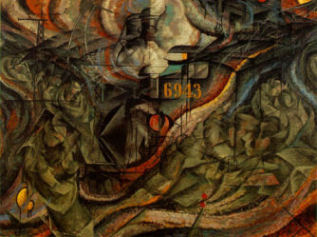Course Objectives
The course will introduce you to some important theoretical issues in cognitive science. Cognitive science is an interdisciplinary approach to the study of the mind. It uses methods and theories from numerous disciplines: psychology, neuroscience, computer science, philosophy, linguistics, anthropology, and others. Topics studied by cognitive scientists include intelligent behavior, information processing, judgment and decision making, emotions and moral reasoning, language and communication, and social interaction.
Cognitive science speaks to some profound questions concerning the human experience, including consciousness and self-awareness, artificial intelligence, mind as machine, the connection between brain and mind, and evolutionary theories of behavior. The objective of this course is to provide you with an understanding of the debates surrounding these questions, and positions that cognitive scientists have taken on these and other issues.
Instructor

Gordon Pitz: Room 200, Howell Hall
Office hours:
Monday, Wednesday, 3:00 pm - 4:30 PM
Tuesday, Thursday, 2:00 PM - 3:30 PM
Other times by appointment - please check with me by e-mail.Send e-mail to pitz@unc.edu.
Prerequisites
Enrollment is open to any student who has completed PSYC 101 and either PSYC 210 or 215. However, prior study of cognitive psychology, memory, perception, or decision making, or a background in computer science or philosophy, will be helpful.
Note: Details of the syllabus are subject to change as we go along. All changes will be announced on the web - see Announcements. If you have suggestions for changes, or if information presented here is unclear, please bring your ideas or the problems to my attention at pitz@unc.edu.
The web site for the course can be found at tinyurl.com/unc-psyc-431. The web site is part of the UNC Sakai Pilot Project. You use the Sakai portal to submit assignments, and you can find information there about your grade. If you have questions about the course material, you may post them in the discussion forum.
As a registered participant in the Sakai project, you will have access to your own workspace.
The textbook is Cognitive Science: An Introduction to the Science of the Mind , by José Luis Bermúdez. A series of study exercises and discussion questions has been prepared to help you in reading the textbook. These exercises and discussion questions will be reviewed in class. You will be expected to provide your own answers to these questions when each chapter from the book is discussed (see Class Participation).
The schedule page gives the date by which you must read each chapter in the textbook. Read each chapter by the due date and come to class with your answers to the questions.
Cambridge University Press, the publishers of the textbook, provide a web site containing a number of other useful resources.
In addition to the material in the textbook, four or five special topics will be treated in greater detail. For these special topics, other readings will be assigned (see Special Topics for further details). Pdf copies of the papers are available on-line. Review questions for these special topics will help you with the readings.
The schedule page gives the date by which you must have read each assigned article. You must complete the assigned readings prior to the discussion of the special topics in class.
There will be two exams, a midterm (March 3) and a final (May 5). Both exams will consist of questions based on the textbook and other assigned readings. Sample test questions and review materials will be made available (see Topics for Exam 1 and Exam 2).
If you have to miss the midterm test due to illness, personal emergency, or contractual obligation, you may take a makeup test. You must request a makeup within one week of the original test, and provide documentation for the excused absence. Please review the university's rules concerning rescheduling the final exam. In general, this can be done only with the approval of your Dean, or with notification from the student health service.
A significant part of the final grade will be based on a term paper. In the paper you must select any topic in cognitive science that interests you, and develop a research proposal for that topic. I will provide a list of possible topics, but you need not feel constrained by that list.
You should consult with me on ideas for your term paper. A preliminary proposal for your paper is due March 24. The proposal will not be graded, but there is a penalty for being late. See Term Papers for more information.
Outlines and papers should be submitted from the Assignments section of your Sakai Portal. Select the appropriate term paper assignment. The schedule for submitting the paper is as follows:
March 24. A brief description of the topic for your paper (Not graded, but 1 point penalty per day late).
After receiving your description, I shall try to provide you with some references and ideas that you may find helpful.
April 7. An outline of your paper, indicating your progress to date (Not graded, but 1 point penalty per day late).
This will be another opportunity for feedback and suggestions.
April 29 (Friday). The final version of the paper is due by midnight. Late papers will not be accepted.
The paper should be between six and ten pages long, typed double spaced, not including tables, figures, or list of references.
You should feel free to consult with me at any time on the content of your paper.
There will be six other short written assignments, roughly one every two weeks (see Other Assignments). These too should be submitted from the Assignments section of your Sakai Portal.
The assignments will test your understanding of the material by asking for examples or explanations of important theoretical concepts.
Read the required chapters or other assigned articles by the due date and come to class prepared to discuss them.
You are expected to have answers to the review questions for each chapter, and to contribute actively to class discussion of the textbook and other readings.
If you are reluctant to answer questions or state opinions in class, you may also earn participation credit by contributing to (or starting) discussions on-line using the Discussion Forum on the Sakai portal.
Grades are based on the exams, reports, and term paper, and on your contributions to class discussions, adding up to 400 points total.
Midterm Exam 100 points Final Exam 100 points Answers to assigned questions, 10 points each 60 points Term Paper 100 points Class Participation 40 points
Your final grade will be based on the total points earned during the semester. The Grading scale is shown below.
The most important questions concerning the Honor Code for this course are likely to arise in connection with written reports and assignments. Please read the following carefully, and be sure you understand what is and is not considered to be acceptable and authorized help.
All research and scholarship uses and refers to research and theory published by other investigators. When you refer to the work of others you must give full credit to the original source. Cite the work in the body of the text using name and date (e.g., Gintis, 2009), and provide the complete citation in a list of references at the end, using APA format. See the handout on writing reports for examples of the format.
If you use the exact wording from a source, that text must be set in quotation marks, with an appropriate page reference. Notice, however, that in the sciences it is generally better to paraphrase the work of others, rather than quote verbatim. Use your own words rather than quote the original exactly.
Another source of confusion arises from the fact that all students will write answers to the short assignments, and you are likely to discuss your answers with others. The central principle governing written work is that, while you are free, even encouraged, to discuss your ideas with other students, the written form of your papers and reports must be your own independent work.
I use your written answers and papers as an indication of whether or not you understand what you are writing about. If your understanding comes from discussing the ideas with other students, that's all to the good. The test of your understanding, however, is your ability to express the ideas in writing. Thus, the written material (your wording of the ideas) must be your own. Do not share your written answers with others.
In other words, it is never a bad idea to seek ideas and explanations from other students. It is a violation of the honor code, however, if the written expression of your understanding uses help received from others.
Notice that this principle is very similar to the principle underlying copyright laws. One cannot copyright an idea, but the expression of an idea is subject to copyright.
